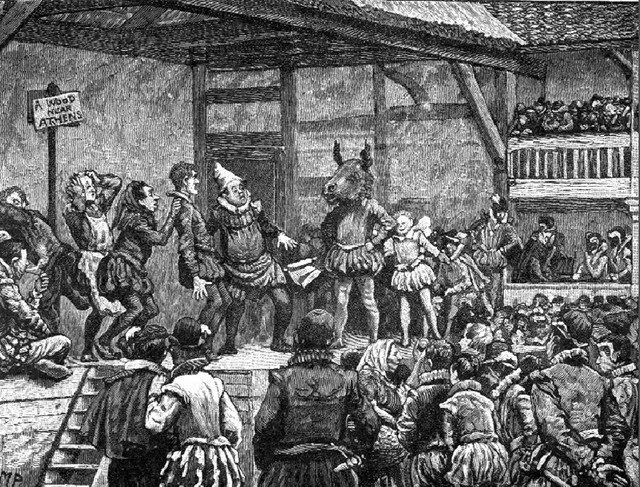By: Sydney Vollmer, ARB Intern
 I’m pretty sure that during a quiz my freshman year of high school I couldn’t remember the term for the people who stood in the pit of the Globe Theatre to save my life. I sat in my honors English course feeling very stupid, and eventually turning in my quiz knowing I had failed to comprehend even the simplest term surrounding Shakespeare.
I’m pretty sure that during a quiz my freshman year of high school I couldn’t remember the term for the people who stood in the pit of the Globe Theatre to save my life. I sat in my honors English course feeling very stupid, and eventually turning in my quiz knowing I had failed to comprehend even the simplest term surrounding Shakespeare.
Now I’m aware, as I’m sure you are as well, that those smelly folks who couldn’t afford more than a penny to see a show were called groundlings. A penny may seem like nothing to us now, but back then it was the equivalent to 10% of one day’s wage (Globe Theatre Groundlings, n.d.). The majority of groundlings were London apprentices who were shirking their trades to see a show. This led to disgruntled employers as well as some rowdy activity in the crowds, due to the age of most groundlings. The players were not entirely happy either. As Shakespeare’s Hamlet speaks of the groundlings in Act 3, Scene 2:
“O, it offends me to the soul to hear a robustious periwig-pated fellow tear a passion to tatters, to very rags, to split the ears of the groundlings, who for the most part are capable of nothing but inexplicable dumb shows and noise.”
And, it was not uncommon to find a prostitute among the throng, or to be hit with some flying fruit or nuts, or especially to be pushed and shoved among the 500 others with whom you stood! (Glanville).
 How are you like a groundling then? Let’s put this into more of a relevant context. Imagine there is this concert by an artist you really love. Even if you don’t personally spend your money this way, people today pay through the nose for the chance to be as close to the celebrity as possible, even if it means they’re stepped on, shoved, sweat on, or hit (accidentally?). It’s no longer the lower class that stands in the front, but the people who keep clicking refresh on Ticketmaster with their loaded credit cards at the ready.
How are you like a groundling then? Let’s put this into more of a relevant context. Imagine there is this concert by an artist you really love. Even if you don’t personally spend your money this way, people today pay through the nose for the chance to be as close to the celebrity as possible, even if it means they’re stepped on, shoved, sweat on, or hit (accidentally?). It’s no longer the lower class that stands in the front, but the people who keep clicking refresh on Ticketmaster with their loaded credit cards at the ready.
In addition, it’s a common misconception that the poorest of the poor were groundlings. If only the poorest could have witnessed live theatre! No, they were more worried with having food than entertainment. In fact, it was the lower middle class that could afford to stand before the stage. The same is true in today’s world. The poorest of the poor probably aren’t going to live shows of any sort. Even if students can buy tickets for under $20, not all people have expendable income for entertainment.
Continuing with today’s entertainment industry, it’s ironic that now the term groundling has nothing to do with someone’s income or ability to pay for a seat. Rather it’s a term that refers to improvisational actors who participate in The Groundlings Theatre & School. A little fun fact is that many of the actors who have been a part of Groundling productions have moved on to bigger and better things, such as being cast on Saturday Night Live and becoming very well-known comedians and film stars (The Groundlings).
Glanville, Corrie. “The Life & Times of a Groundling.” ArtsEmerson Blog. N.p., 02 Oct. 2012. Web. 22 Sept. 2015.
“Globe Theatre Groundlings.” Globe Theatre Groundlings. N.p., n.d. Web. 22 Sept. 2015.
“The Groundlings.” Website. N.p., 2015. Web. 22 Sept. 2015.
